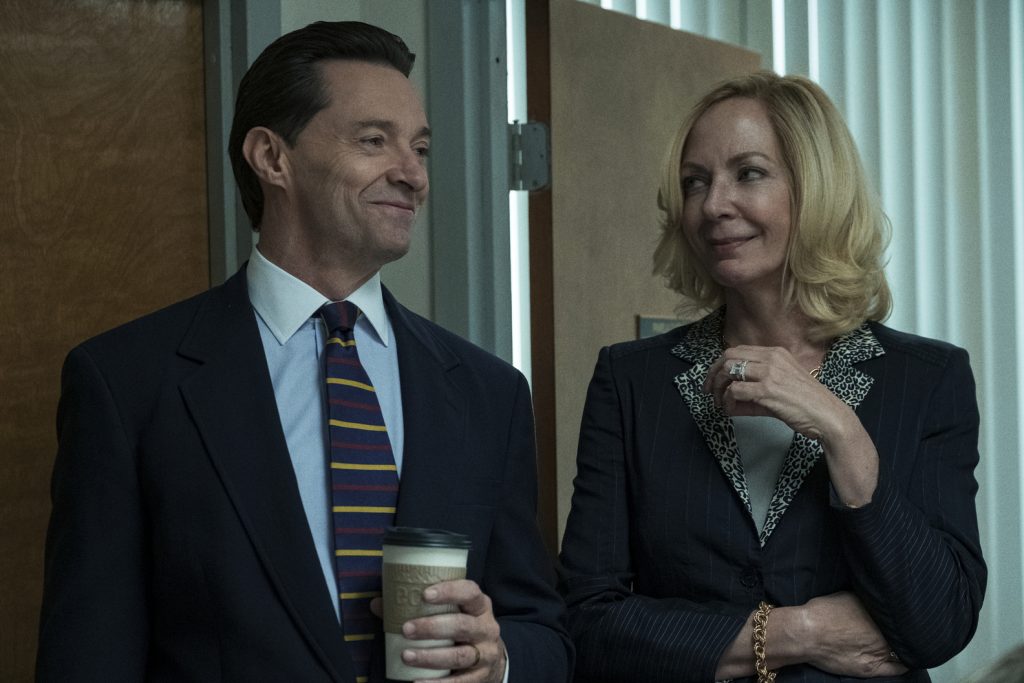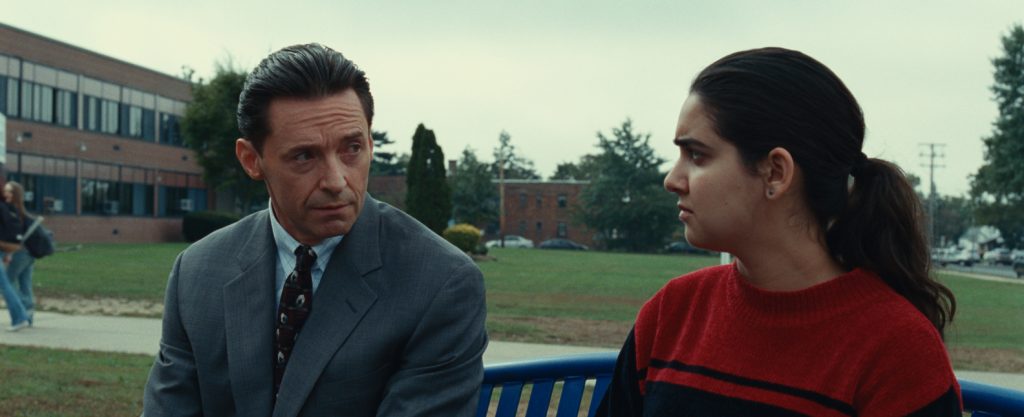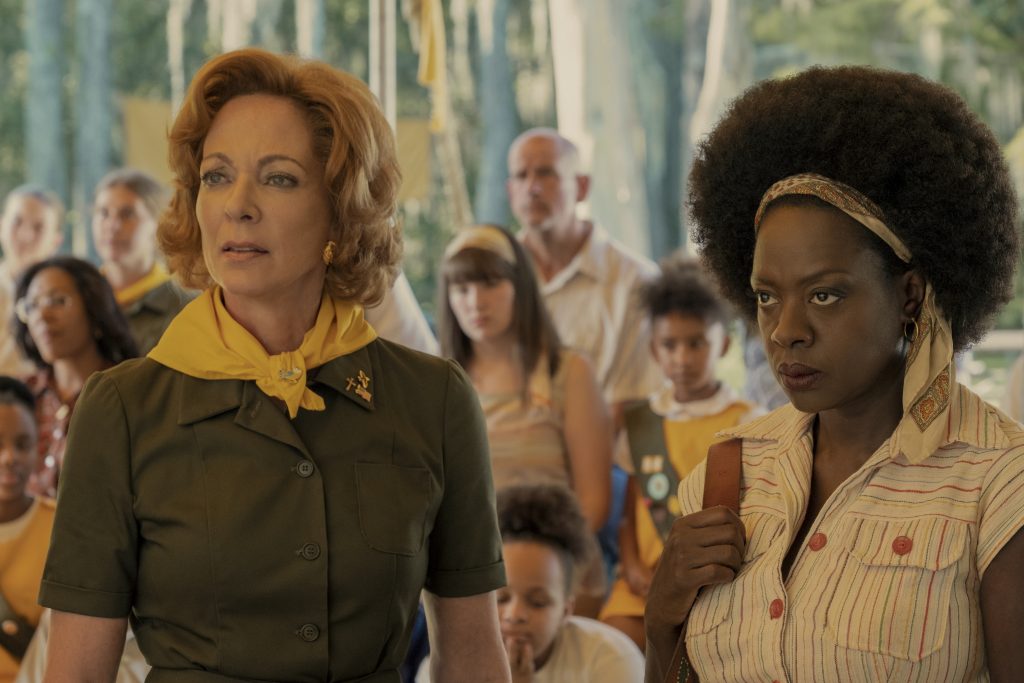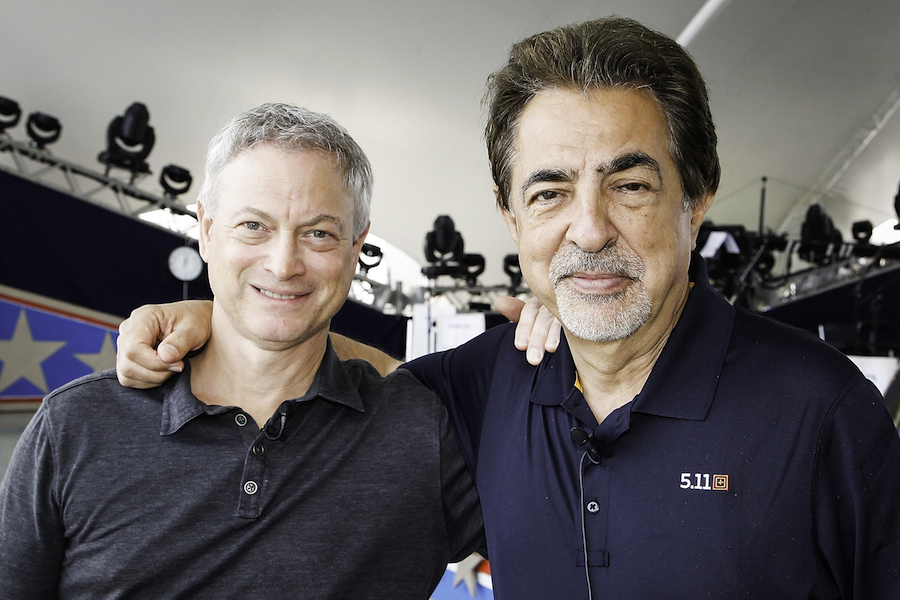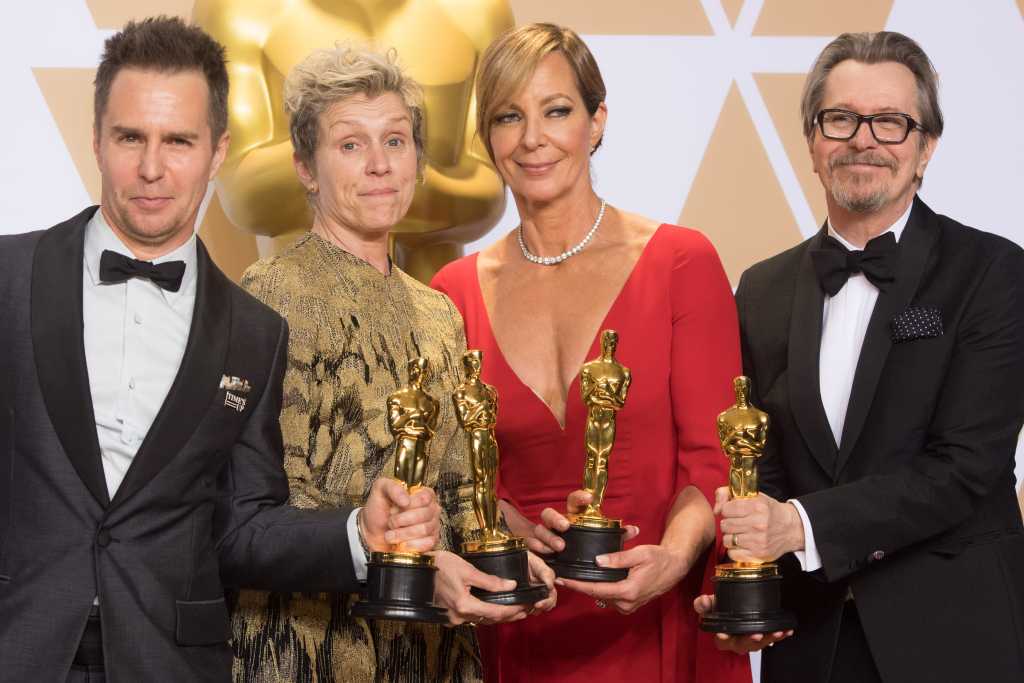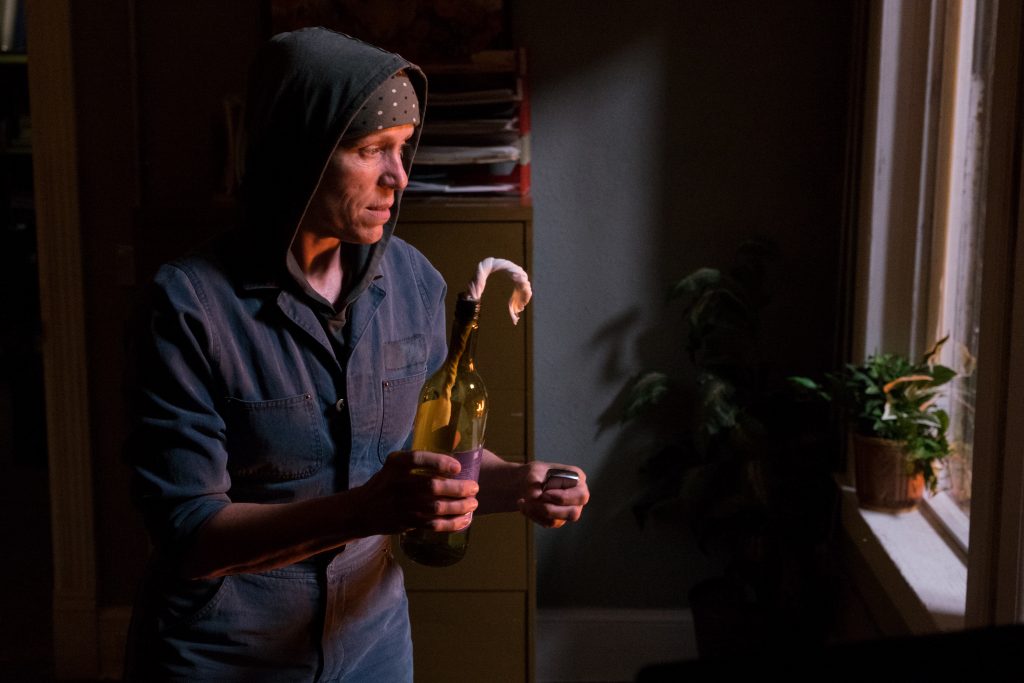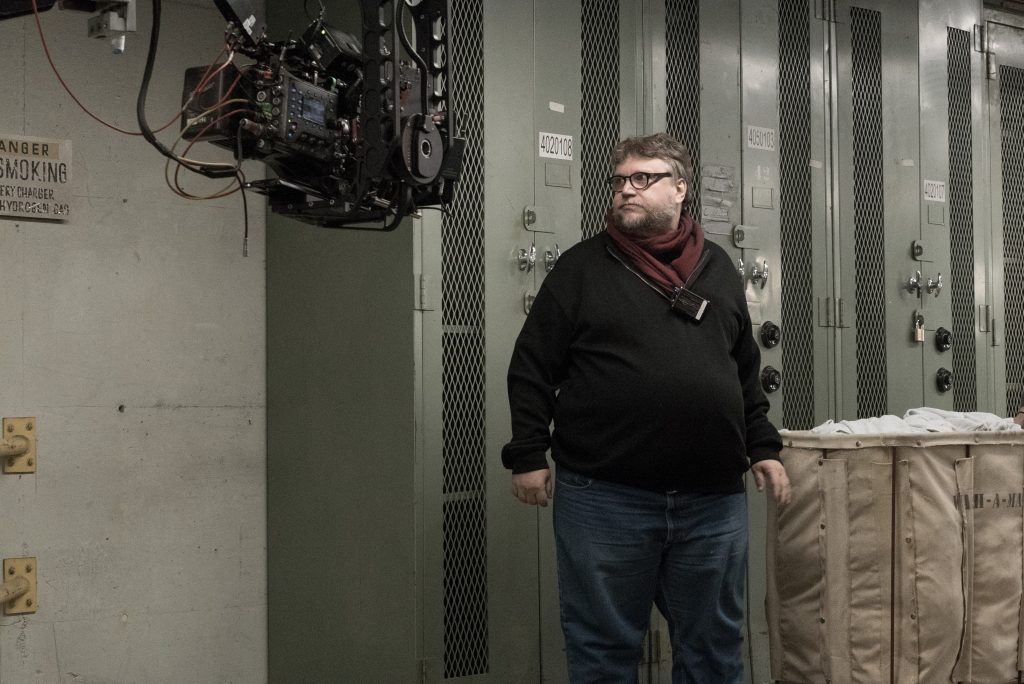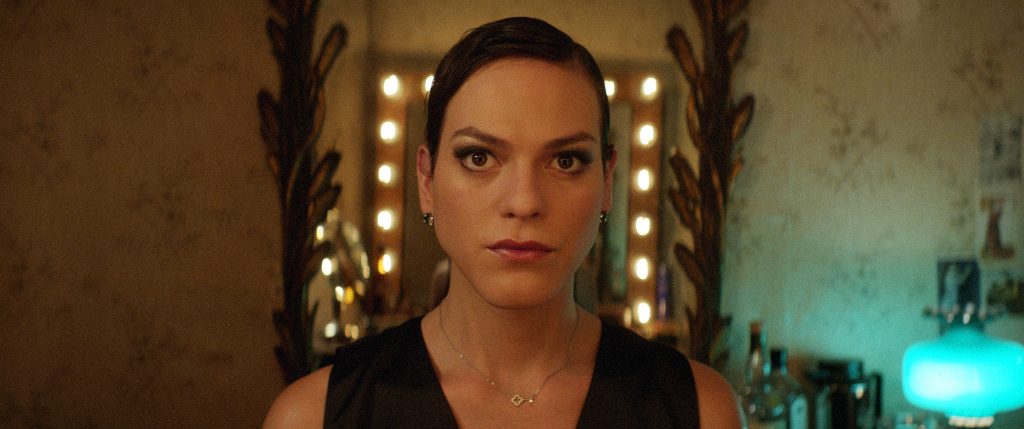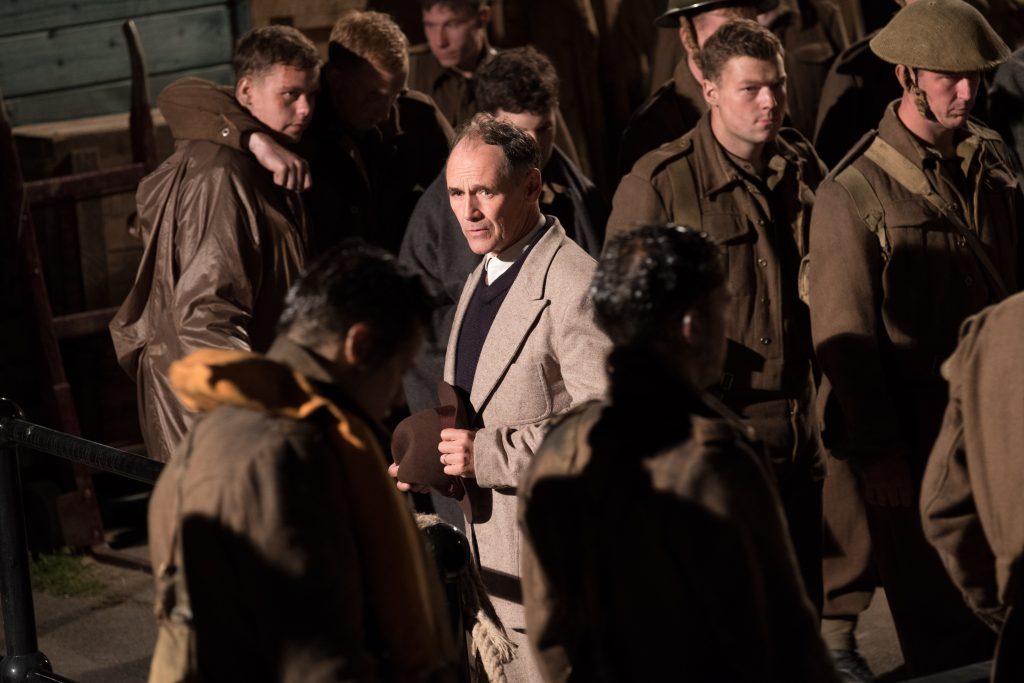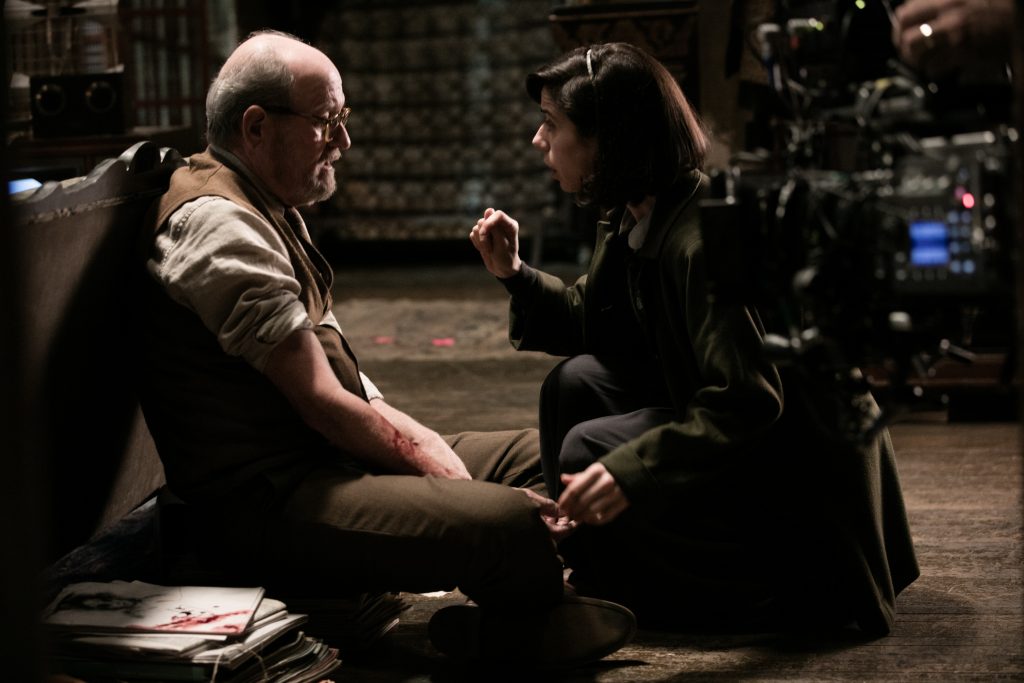February 21, 2021
by Carla Hay
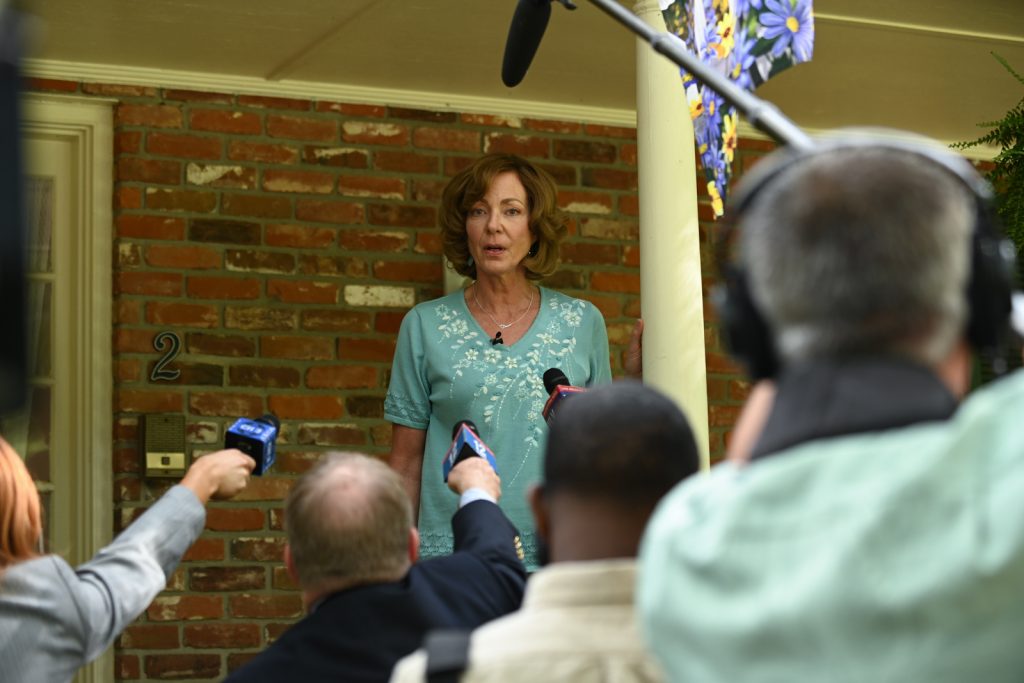
“Breaking News in Yuba County”
Directed by Tate Taylor
Culture Representation: Taking place in the fictional U.S. Southern city of Stanlow, the dark comedy “Breaking News in Yuba County” features a predominantly white cast (with some African Americans, Asians and Latinos) representing the middle-class, working-class and criminal underground.
Culture Clash: A lonely, middle-aged woman pretends that her philandering criminal husband has been kidnapped (even though he really died of a heart attack), so that she can get sympathy and attention.
Culture Audience: “Breaking News in Yuba County” will appeal primarily to people who are fans of star Allison Janney and to people who don’t mind watching incoherent movies about people behaving badly.

Oscar-winning actress Allison Janney has worked with director Tate Taylor in all of his feature films so far, and she usually plays supporting or minor characters in these movies. The dark and violent comedy “Breaking News in Yuba County” is the first Taylor-directed film where Janney is front and center as the movie’s lead character. And it’s a dreadful misstep not only for Taylor and Janney but also for everyone involved in this embarrassing mess. “Breaking News in Yuba County” (whose producers include Taylor and Jake Gyllenhaal) is proof that having a talented cast doesn’t automatically equal a good movie.
In “Breaking News in Yuba County” (whose horrendous screenplay was written by Amanda Idoko), Janney portrays Sue Buttons, a lonely woman who feels neglected and under-appreciated and goes to extreme lengths to get attention. The movie shows obvious signs that Sue doesn’t get the respect that she thinks she deserves, to try and make her look sympathetic. But her personality and actions are so off-putting (and so are almost all of the characters in this stinker film) that the movie’s attempts to be comedic are pathetic and monotonous.
“Breaking News in Yuba County” takes place in an unnamed U.S. state in the South, in a fictional city called Stanlow, located in Yuba County. In the movie’s opening scene, viewers see Sue listening to motivational affirmations on her iPod as she goes to a supermarket. She repeats these mantras several times throughout the movie: “My story matters. I am enough. I am confident.” Sue’s self-directed pep talks do little to change the way that the outside world treats her. And something happens on her birthday that causes her to snap and go from being a mild-mannered, law-abiding citizen to being a stone-cold, heartless fraudster.
She arrives at the grocery store to pick up her small birthday cake, which is inscribed with the words “Happy Birthday, Sue.” But Sue notices that the “e” looks more like a “c.” She points out this mistake to the pastry worker behind the counter, with a tone of voice implying that she wants the error corrected. But the worker just ignores Sue’s attempt to assert herself and asks if Sue is paying by cash or credit.
Sue is married to a corrupt banker named Karl (played by Matthew Modine), who’s first seen at their home talking dirty to a woman whom he plans to meet later for a sexual tryst. Sue doesn’t know about this affair but she’ll soon find out on her birthday. She’ll also find out later about her husband’s illegal activities. In the meantime, Sue has made plans for her and Karl to have a romantic dinner at a restaurant on her birthday.
But as soon as she arrives home, Karl is out the door to go meet up with his mistress. Meanwhile, Sue takes her birthday cake and makes the correction on the letter “e” herself. She then goes to her job, a place called Sidewinder Safety Tubs, where she works in customer service at a call center. The only work on the job that the movie shows her doing is taking one phone call from a rude customer who curses at her.
Considering all the ludicrous shenanigans that Sue gets up to later that take up all of her time, the movie shouldn’t have bothered showing her having a job at all. This movie is so badly written that it’s never explained how Sue took all the time off from work that she takes to try to cover up her web of lies. But the filmmakers seem to assume that everyone who’s watching this movie is as idiotic as the characters.
Sue just happens to be driving near a motel when she sees Karl’s car parked outside. She gets out and sees him holding some flowers and going into a motel room while calling a woman inside “honey” before he shuts the door. An alarmed Sue goes to the motel’s front desk and correctly assumes that the room is reserved in Karl’s name. Sue tells the front desk clerk that she’s his wife and pretends to have accidentally locked herself out of that room, so she asks for a spare key.
Sure enough, when Sue lets herself into the motel room, Karl is having sex with another woman, whose name is Leah Norton (played by Bridget Everett), whom Sue has never met before. Sue gets angry, while Karl and Leah are naturally startled and horrified at being caught. Karl is so surprised that he falls off the bed, has a heart attack, and dies.
While Leah is freaking out and babbling, Sue finds out that Leah is also married. She slaps Leah and tells her that she will inform Leah’s husband about Leah’s cheating if Leah doesn’t leave the motel immediately. Sue also tells Leah that Sue will take care of the problem of Karl’s dead body. Leah doesn’t hesitate to quickly leave the motel.
Instead of being upset that Karl is dead, Sue forlornly says out loud as she sits on the bed, “You forgot my birthday.” Sue then hatches a plan to bury the body in a lot near the motel. This movie is so stupid, that it shows Sue digging the grave in plain view where anyone could have easily seen her. But there would be no “Breaking News in Yuba County” if she were caught that quickly and easily.
Meanwhile, Sue doesn’t find out until after Karl dies that he was involved in a money-laundering scheme with some local criminals, who used Karl to launder millions of dollars. The people in this illegal enterprise are a ruthless crime boss named Mr. Kim (played by Keong Sim); his sometimes-bungling daughter Mina (played by Awkafina), who tries to be as tough as her father; a menacing, trigger-happy thug named Ray (played by Clifton Collins Jr.); and Karl’s younger brother Petey (played by Jimmi Simpson), who’s been trying to leave his criminal life behind.
Petey works as a salesperson at a furniture store named Rita’s, owned by a sassy lesbian named Rita (played by Wanda Sykes), who manages the store with her equally feisty live-in girlfriend Debbie (played by Ellen Barkin). Rita and Debbie know that Petey has a criminal background, but he’s told them that he’s trying to “go straight” and stay out of trouble. Debbie is often suspicious of Petey and sometimes accuses him of stealing from the store. Meanwhile, Rita has a friendly rapport with Petey, and she strangely tells Petey that she wouldn’t mind too much if he was caught stealing because she would understand that he would be stealing out of desperation.
Sue is fixated on a local news/public affairs TV program called “The Gloria Michaels Show,” which has been doing constant coverage of a missing 13-year-old girl named Emma Rose. After Sue has buried Karl’s body, she goes home and watches the show. She has a silent “a-ha” moment when she sees Emma Rose’s parents Jonathan and Robin (played by Michael A. Newcomer and Liz Elkins Newcomer) being interviewed by host Gloria Michaels (played by Juliette Lewis), who tells the distraught parents that they have the unwavering support of the community in finding Emma Rose. Gloria is a TV personality who’s a mix of Nancy Grace and Deborah Norville, even down to having the same type of blonde bob hairstyle and Southern accent.
Sue decides that she can get the public’s sympathy and attention if she pretends that Karl is missing. Sue calls the restaurant to cancel the dinner reservation by saying that her husband isn’t feeling well. It’s a discrepancy (and plot hole) that a good investigation team would be able to uncover when Sue later reports that Karl is missing. She foolishly claimed that Karl disappeared during the time she said that he was too “sick” to go to the restaurant. Another big plot hole is that Sue never bothers to contact anyone to try to look for Karl. But, of course, this movie has incompetent cops who investigate and overlook many of these things that would expose her lies.
Sue goes to the local police station to report Karl’s disappearance, but the officer on duty, Detective Cam Harris (played by Regina Hall), is impatient and dismissive, especially when Sue tells her that Karl has been missing for less than 48 hours. Detective Harris doesn’t file a report and instead advises Sue to ask Karl’s friends and relatives if they know where he is, because many missing spouses usually have just gone somewhere without telling their spouses. Once again, Sue feels ignored and disrespected.
The gravity of what Sue has done begins to sink in with her. When she goes home, she has a meltdown and starts trashing her house. She picks up the birthday cake, as if she’s going to destroy it too, but she can’t bring herself to do it. It’s symbolic of how she’ll take extreme measures later in the story to save herself and destroy others, just so she won’t be exposed for committing the crimes of illegal disposal of a corpse and lying to the police.
Sue has a younger half-sister named Nancy (played by Mila Kunis), who comes over to visit shortly after Sue has her meltdown. The house looks like it’s been ransacked, so Sue pretends to be distraught that Karl is missing. Sue also plays along with Nancy’s assumption that Karl was probably kidnapped during a home invasion.
It just so happens that Nancy is a highly ambitious and competitive TV reporter who works for a local station that’s a rival to the station that has “The Gloria Michaels Show.” Sue and Nancy see Karl’s “disappearance” as an opportunity to get media attention for themselves. Predictably, Nancy offers to interview Sue on TV about the “disappearance.” Nancy doesn’t really care that Karl could be missing; she just wants to get a “news scoop” over the competition.
This TV interview is the first time that Petey finds out that his older brother Karl is missing. And that’s a problem because Karl had $3 million that he was supposed to launder, so now that money is missing too. In a panic, Petey tells Mina and Ray that he doesn’t know where Karl or the money is. And inexplicably, Mina decides to tell Petey that she and Ray have kidnapped Karl, so that they can extort $20,000 in ransom money from Petey. It’s a dumb decision by any standard, but it’s an example of how bad this movie is.
What follows is a convoluted and messy farce, with betrayals, more lies, and people inevitably getting killed in brutal ways. Detective Harris is the only cop on the case who gets suspicious of Sue. But Detective Harris is stonewalled by her dimwitted junior cop partner Officer Jones (played by T.C. Matherne) and their boss Captain Riggins (played by Dominic Burgess), who both think that Sue doesn’t seem like the type who could be a criminal mastermind. It’s a subtle commentary on how certain people, because of their physical appearance, are given a “privileged pass” with law enforcement.
The movie has a few supporting characters that don’t have much to do except be possible targets of violence. Petey has a pregnant girlfriend named Jonelle (played by Samira Wiley), who grows concerned at how strange he’s been acting lately. Her pregnancy only seems to be in the movie so there’s an inevitable scene of a pregnant woman in a vicious fight. And then there’s one of Karl’s bank colleagues named Steve (played by Chris Lowell), who doesn’t do much but act frightened when Mina and Ray predictably show up at the bank to look for Karl.
This type of low-quality movie usually has a cast of unknown actors. But it’s very disappointing to see how many talented and famous actors (who are all known for doing much better work elsewhere) are in this atrocious movie. Not even the action stunts are interesting to watch.
And the tone of the film is horribly uneven, as the actors do their performances as if they’re in very different films. Awkwafina, Barkin, Sykes, Kunis, Hall and Simpson act as if they’re in a goofy slapstick comedy. Matherene, Burgess, Wiley and Lowell act as if they’re in a serious drama. Janney, Lewis, Collins, Sim and Everett come closest to capturing the movie’s intended dark satire. Modine isn’t in the movie long enough for most viewers to care about his Karl character, who seems to be despicable anyway.
Almost as annoying as this movie’s characters is the music score by Jeff Beal, because it’s the epitome of sitcom smarm. Given how violent this movie is, the music is completely out-of-place and awkward, because it sounds like something that should be for an outdated family comedy series on TV. The overall direction of the movie is lazy, as if Taylor just let the actors do their own thing instead of having a cohesive tone for the film. And clearly, the filmmakers didn’t do enough to fix the many problems in the screenplay.
It seems as if “Breaking News in Yuba County” tried and failed to be like a Guy Ritchie crime film, by having a story where lawbreakers comically try to outdo each other in absurd ways, while they attempt to cover up everything and blame their misdeeds on other people. There are plenty of female-centric dark comedy satires that get all the elements right, including 2017’s “I, Tonya,” the movie that garnered Janney her Academy Award. Sometimes bad movies are fun to watch, but “Breaking News in Yuba County” is the type of irritating movie where viewers can’t wait for it to be over and won’t care what happens to the characters in the end.
MGM’s American International Pictures released “Breaking News in Yuba County” in select U.S. cinemas and on digital and VOD on February 12, 2021.

